- Home
- Patricia Wynn
Jack on the Box Page 3
Jack on the Box Read online
Page 3
“Thank you. I was not. But I commend you,” she added, turning briskly away to resume a stiff posture, “for your rapid handling of the situation.”
Jack expressed his thanks and leaned back against the seat again, allowing himself one brief moment of peace before descending to deal with his duties. His left arm ached terribly, and he sighed as he contemplated the hours of repair that were surely before him. It would be a severe penance, surely, for the few seconds’ pleasure of holding his companion about the waist. The passengers on the roof were moaning and a few of the women inside were weeping. He could not ignore them any longer. Slowly and painfully, he descended from the box.
Davies and the young scholar, who had miraculously managed to hold on during the careening of the coach, had already jumped down and were doing their best to calm the ladies. Jack gave them both a grateful look before he went to secure the horses. He already knew what the problem was, and saw nothing for it but to lead the horses into the next village and wait for new harness to be made. The passengers, he knew, would not be happy to have to wait, and it was possible that word of his carelessness might get back to the proprietors. In that case, his pay would be severely docked. The threat of transportation rose frighteningly in his mind.
The horses were surprisingly calm after their rash performance. Jack knew that they were merely exhausted, too much so to fly off the handle again. He secured both leaders to a tree and returned to face the passengers. It would be up to Davies to ride one of the leaders to the next stop to advance the mail. The rest of the horses would have to be walked to cool them off,
Although Davies’s calmness had done much to restore the goodwill of those inside the coach, when Jack stepped up he was greeted by a chorus of complaints.
“I knew no good would come of letting that girl up on the box!” asserted the red-faced woman amidst cries of agreement.
Acutely aware that his inattention had been for that very reason, Jack was hard-pressed to answer her courteously, but he spoke with admirable restraint. “You are mistaken, madam. A rein on one of the leaders simply broke. I cannot imagine how a passenger on the box could be considered responsible for that. It is one of those things that happens from time to time. I am sorry the horses bolted and caused you all such a fright, but I assure you the matter will be corrected as soon as possible.”
His politeness had its usual effect, for even though a murmur greeted his words, it was largely in approval of the justness of his remarks. Taking this as a sign that he might now get on with the unpleasant task of walking the horses to the next village, Jack went back to unharness them.
Davies climbed back up on his seat to unlock the box that held the mail. But, as Jack approached the front of the coach with the intention of offering to help his mysterious passenger down, she hailed him.
“Pardon me,” she said eagerly, and without a trace of her earlier embarrassment, “but I think I might be of assistance.”
Jack smiled openly at the notion that such a slight girl could help him with his wearisome task. He offered his hand to help her alight. “Could you, miss?” he indulgently asked.
“Oh, yes, I’m almost certain,” she said, and began to fumble in her reticule.
Jack watched her with undisguised delight, thinking it was almost worth having the accident to see what she would produce. In a moment, she had pulled a strange object from her bag and was holding it up triumphantly for his inspection.
“There! You see?”
Jack reached out and took the object from her. It was a contraption of sorts, made of a short strap of leather with a buckle on each end. As he examined it, Jack began to feel that perhaps it could be of use to him. He looked up at his passenger, his curiosity fully aroused.
“What is it, if you please? How does it work?”
The lady took back the contraption and walked over to the horses, with Jack half a step behind.
“I will show you,” she said. “You see, you must simply cut a hole in each end of the broken strap and then thread each of them through a buckle—like this.” She showed him how the two ends fit into the buckles, and Jack could see that the contraption would indeed provide a temporary solution to his problem.
“I don’t suppose you should go very far without having the harness repaired,” she concluded, “for it wasn’t meant to do more than help one on to the next stop. But it ought to hold as far as that.”
“That far and then some,” Jack agreed. “What a clever device! How did you come by it?”
“My grandfather made it,” she said proudly “He copied it from a friend’s invention. And he has always insisted that I carry it with me whenever I travel.”
“It’s a stroke of genius!” Jack declared. “I will set to work on those holes right away.” He handed the device back to her, and, taking his knife, began to cut small holes through the broken pieces of harness. The young lady stood waiting patiently, and even seemed pleased to be assisting in such a task.
When he had finished, Jack took the buckles from her again. “I must confess”—he grinned—”I did not see what you could possibly have in that reticule that would help.”
She laughed. “I suppose you wouldn’t. And I will confess, in turn, that this is the first time I have had the opportunity to use it. I have transferred it from one reticule to the next many times, wondering if I was just being foolish. But I could not bring myself not to carry it when my grandfather trusted me to. I have almost become superstitious about it.”
“Well, it certainly proved useful today. You will have my undying gratitude.” Smiling broadly, he nearly extended his hand before recollecting his position.
She must have noted his aborted gesture, for she coloured and looked away. “I was happy to be of service,” she said, inclining her head graciously.
Jack was once again abashed, but this time not for his impertinence. He knew that the young lady had not intended to reprove him for what was no more than a friendly gesture. But he was angry with himself for forgetting his inferior station. The truth of the matter was, he thought, that he was having such fun talking to this unnamed lady that he could not remember to keep his mind on his job.
Resolutely he turned back to work. Davies came hurrying up with the mail bag, but Jack showed him the young lady’s device which had allowed him to fix the reins in a trice. The older man grunted with satisfaction, and, with a respectful tip of his hat to Jack’s companion, returned the mail to its box in the boot. In a moment they were ready to proceed. Jack handed the lady back up onto the box and informed the rest of the passengers of their good fortune. Even the red-faced woman was happy to hear that they would not be obliged to wait untold hours for the horses to be brought back to the coach, and Davies expression revealed his relief.
So Jack was able to resume his seat with the satisfaction that all was well and the impossible had been accomplished in a matter of minutes. Very little time had been lost, for the horses had bolted in the right direction and their run had almost compensated for the time the coach had been stopped. Still, Jack knew he must be careful not to risk straining the horses any further, so he kept them to an even pace for the remainder of that leg of the journey.
He was glad to find that his inappropriate manners had not silenced his passenger entirely, for as soon as they started off again, she began to chat as easily as before. This time he was careful not to forget himself, and they passed the rest of the journey in companionable ease. The young lady expressed such a keen interest in his driving that he would have liked to offer her the chance to handle the ribbons, but he feared that such an offer might throw her out of countenance. As small as she was, he would have to have maintained his own hold on the reins, and that would not have done at all.
In spite of the horses’ slow pace, it seemed to Jack that they arrived in Hockley Heath all too soon. His pretty passenger prepared to alight.
“I could return your grandfather’s contraption to you on my way back through town,” he suggested
—not without a flicker of hope—as they threaded their way through the village.
She seemed to withdraw slightly again, as if she feared a resumption of his improper familiarity, but she gave him a polite smile. “That will not be necessary. I do not mean to travel again any time soon, but were I to do so, I am certain my grandfather would have another he could give me.”
Jack tried to sound disinterested, but he found that it cost him no small effort. “That’s all right, then. But I must thank you again for coming to my assistance.”
She inclined her head, and dimpling, said, “It will please my grandfather enormously to learn that I finally had use for it!”
Jack grinned. “I’m certain it will.” Then, with a sense of deflation, he drew the horses to a stop a short distance before the inn where the horses were to be changed. “Is this where you wish to be set down?”
“Yes, this will be all right.” He thought he heard a sigh when she said this, as if she had something unpleasant to face. But she did not meet his gaze, so he could not be certain.
He jumped down from the box and helped her down. Then he stood uneasily, wishing to take her hand, but knowing that it could not be offered.
“Farewell, miss,” he said, hoping that his voice did not betray his reluctance to see her go.
“Goodbye—and thank you for taking me up.” She seemed to hesitate a moment, as if she would have said something else. Then, giving him a gentle smile, she turned and walked away.
Jack stood and watched her retreating form until Davies called out to remind him of the time. Then he turned back to the coach, feeling inexplicably glum.
The change of horses and harness was accomplished in less than two minutes, and Jack hastened the coach onwards over the last leg of his ground, hoping to arrive in Birmingham on time despite the accident. Before they had gone very far out of the village, Davies climbed forward and joined him on the box. He eyed Jack with a curious glint.
“An agreeable young lady,” he observed, as Jack stared at the road in front of him. “Not too high in the instep, as anybody can see she’d a right to be.”
“Yes, she was, and no, she wasn’t,” Jack agreed, but not in a tone to invite any more comments.
“Saved your hide, she did,” Davies said, winning a reluctant chuckle from Jack. “I’ll have to report the incident on the time bill next stop, but I don’t think I’ll need to mention her in my final report. The contractor back in Shipston gave us a faulty set of harness, that’s all, and the coachman patched the harness so we could proceed.”
Jack threw him a grateful smile, but was soon staring ahead again, lost in thought.
Davies smiled enigmatically, then turned to gaze at the horses. Jack was silent for the rest of the journey, and there was a grim, almost brooding air about him. Anyone looking at him might have said that he was a young man who no longer seemed content with the hand that had been dealt to him. And on this particular day, they would have been right.
Chapter Three
The Honourable Cecily Wolverton (for that was his passenger’s name) strolled briskly into the inn in search of a gig to borrow. She was greeted by the innkeeper with much consternation.
“You may borrow my gig, Miss Cecily, and welcome you are to it, but I will not be having you drive up to your grandfather’s house with no female to companion you. I don’t know what the world’s coming to, but what I do know is your grandfather would rip up at me something fierce if you was to show up at the manor in my gig with no maid! I’ll tell Betsy to go along with you and our Henry will be up there in no time to fetch the gig back.”
Cecily thought it best not to protest, for she knew the innkeeper to be right about her grandfather’s opinions. She merely resolved to tip Henry handsomely for his trouble. The gig was soon brought round, and Cecily set off on the three-mile drive to her grandfather’s house with her hands on the reins and Betsy at her side.
When she drew up before the manor, the door opened and more voices were added to the innkeeper’s, predicting dire consequences to her morning escapade. Sir Waldo Staveley was a just master, but there was nothing in his behaviour to suggest that he would condone the arrival of his granddaughter in anything less than his own chaise. Mrs. Selby, Sir Waldo’s housekeeper, was almost beside herself with injury.
“I will take you to your rooms, Miss Cecily, not but what they aren’t ready for you, as they would have been had you waited for your grandfather’s chaise, which he was sending in nobbut two days. And I will see that your bags are took up. But it’ll have to be Selby what tells him you’ve come in such a hamper-skamper fashion for I’m sure I wouldn’t dare.”
“I have no bags for the present,” Cecily responded sympathetically, “and I am so sorry for throwing you off keel like this, Mrs. Selby, but I had to do it, and that is simply that. If Selby will be so good as to announce me to my grandfather, I shall explain my irregular behaviour to him myself, and I am certain all will be right.”
“No bags!” exclaimed Mrs. Selby, more offended by this, it seemed, than by anything else. “I don’t know what things is coming to, Miss Cecily, I really don’t. But,” she added more kindly, seeing a tired look appear suddenly on her mistress’s young face, “you will want to tidy up now and have a bit of a rest. Those mail coaches go so fast, it’s a wonder you arrived in one piece, and you’ll likely be done up with all the bouncing and rocking. I’ll have Selby announce you after you’ve rested and are ready to see your grandfather.”
Cecily smiled gratefully at her and did take a minute to lie down upon the bed. The journey had been filled with stressful events, not the least of which had been her reason for making it. But right now she gave little thought to the cause of her flight. Her eyes closed and she immediately saw the face of the young coachman as he had looked when gazing at her with an unmistakable gleam of admiration in his blue eyes.
She shook her head, but the vision persisted. He had been totally unlike what she would have expected a mail coachman to be. Young, handsome, well-spoken and clean, he might have been a much higher class of person. In fact, she thought, if she had met him under different circumstances and in different garb, she might have taken him for an equal!
Cecily sighed. It was a pity that none of the gentlemen she had met were so handsome and personable—not that any of them would be interested in her in her present circumstances if they were. Only three years ago, she had been an heiress of such standing as to be an eligible bride for a nobleman of the highest rank. The only child of the Baron and Baroness of Stourport, Cecily was to inherit the major part of the Stourport estate, which had come into her family through her mother.
Her maternal grandfather, the first Lord Stourport, had been granted the barony for extraordinary military service to the Crown. Since the baron had no sons, the patent which created it had specified Cecily’s mother as his successor in order that the title might pass to his direct line, with remainder to heirs general. Cecily’s father, Mr. Stephen Staveley, had assumed his wife’s patronymic, Wolverton, by Royal licence. They had had no sons. But during their lifetimes, Cecily’s parents had built a considerable estate which, due to the unusual origin of their titles, need not have formed part of the barony. Cecily, had she inherited, could have had every expectation of becoming a peeress in her own right, as had her mother.
But two years ago, upon her father’s death, no will had been found. Her father’s solicitor had confirmed the fact that a will had been drawn up in Cecily’s favour and signed, but Lord Stourport had not trusted solicitors and had kept the will at home. An exhaustive search had turned up nothing; the estate had entered the probate courts, and after a lengthy legal battle the court had decided the laws of primogeniture should be applied. The Stourport estate, along with the barony, had passed to Cecily’s Cousin Alfred, and Cecily had taken up residence with her Aunt Emma.
Alfred. At the thought of him, Cecily frowned with vexation. If it had not been for Alfred she would not have fled her aunt’s house s
o rashly. She did not regret her departure, for the day had proven to be singularly interesting, but she feared this would not be the last of her days to be shadowed by Alfred’s existence. She had been planning to move into her grandfather’s house, and his carriage was to have been sent for her two days hence. But yesterday she had received a note from Alfred which had made it imperative for her to undertake the journey on her own.
The thought of Alfred’s note was enough to make her livid. The little beast had had the nerve to send her a most offensive letter, although it had been couched in a respectful tone, as were all Alfred’s speeches, even when what he said was intended to reduce one to ashes. But its suggestion had been so offensive, so odious! Alfred had not taken any pains to remain part of Cecily’s life after the court judgement, other than to express his regret for the part he had to play in the loss of her estate. Cecily had never quite believed that his regrets were sincere. And now! If anyone else had penned that note to her, she would have had to consider it a romantic overture! But knowing Alfred as she did, she could not believe he had the least interest in her womanly charms.
She rose to her feet with a sigh and, after washing her face and hands and pulling a comb through her hair, went to visit her grandfather. Once a robust sportsman, Sir Waldo was now confined to his bed, his gout and rheumatism having crippled him. Cecily tapped softly at the door and heard his gruff, “Come in.”
She tiptoed to the edge of the large canopied bed to plant a kiss on her grandfather’s cheek, but she was not greeted by his usual chuckle.
“Do not think to wheedle me out of my anger, Miss Cecy, for I tell you it will not do!” Sir Waldo said.
“Of course, it will not,” Cecily agreed. “I should never have imposed on you in such a way.”

 The Bumblebroth
The Bumblebroth The Birth of Blue Satan
The Birth of Blue Satan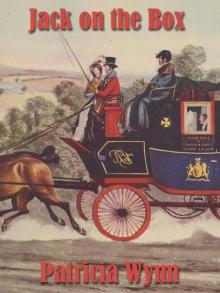 Jack on the Box
Jack on the Box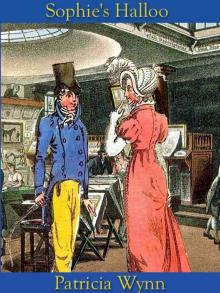 Sophie's Halloo
Sophie's Halloo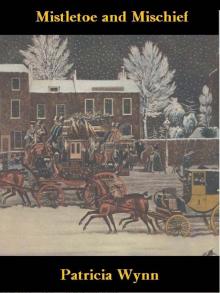 Mistletoe and Mischief
Mistletoe and Mischief The Christmas Spirit
The Christmas Spirit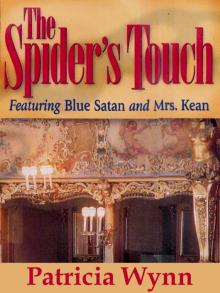 The Spider's Touch
The Spider's Touch A Country Affair
A Country Affair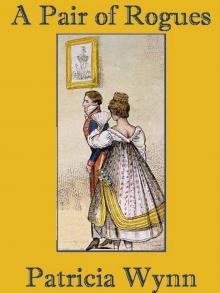 A Pair of Rogues
A Pair of Rogues